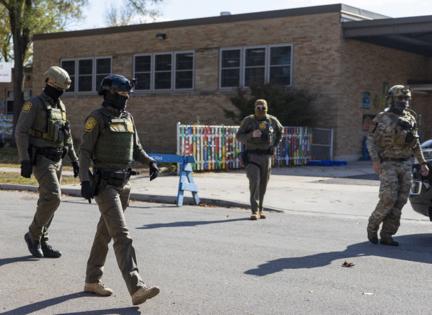Can federal immigration agents go in schools? Here's what to know.
Published in News & Features
CHICAGO — As President Donald Trump’s “Operation Midway Blitz” drags into its third month, federal immigration enforcement activity has swept Chicago’s youngest residents up in the chaos.
At schools and day cares, the fear among families is palpable: Many parents worry they will be targeted during drop-off or pickup. Others, scared to walk outside, are keeping their children home altogether.
Although the mission is said to be winding down, intensified immigration enforcement is expected to continue.
Schools, along with churches and hospitals, were once designated as “sensitive locations,” exempt from such activity. But that Biden-era policy was rescinded when Trump took office — and agents have employed increasingly aggressive tactics as they carry out his immigration campaign in Chicago.
The U.S. Department of Homeland Security has claimed that it doesn’t target schools, and that agents only enter school grounds in special cases “to protect public safety.”
Still, last week, federal agents arrested a day care teacher at a bilingual preschool in North Center. A widely-circulated video showed the woman, who had work authorization, screaming as agents dragged her from the school vestibule.
There have been other incidents involving children, too. A 16-year-old citizen was detained and questioned for hours in Pilsen last month. Earlier, masked agents deployed tear gas across the street from Funston Elementary in Logan Square.
Given the uncertainty, the Tribune asked a legal expert to break down students and families’ rights in schools. “These efforts to harm immigrant communities are harming all of us, and potentially affecting all of our rights,” said Lynn Damiano Pearson, a senior staff attorney with the National Immigration Law Center.
Are federal immigration agents allowed in school buildings?
It’s complicated. In January, Trump rescinded the policy exempting schools, churches, hospitals and other protected areas from immigration enforcement — instead directing agents to act with “common sense.”
But even after the policy change, agents must present a valid judicial warrant signed by a federal judge to enter private areas. That includes schools, where individuals have a right to a “reasonable expectation of privacy” under the Fourth Amendment.
Some exceptions apply. The reception area of a day care center, for example, could legally be considered a public space. “Anywhere beyond that, where there’s a sign that says private, any back rooms, any closed-door spaces, would be generally considered private,” Pearson said.
Most school districts, including CPS, have policies prohibiting immigration enforcement agents from accessing their buildings without a warrant.
The Department of Homeland Security has also said that, generally, it doesn’t raid schools. Even in rare exceptions, agents would be required to get secondary supervisor approval, according to DHS. In a September statement, Assistant Secretary Tricia McLaughlin derided reports of agents in schools as an attempt to “smear law enforcement.”
However, Pearson said schools should remain vigilant. She pointed to the video of the teacher being pulled from the North Center daycare.
“Unfortunately, we’re seeing a lot of disregard for Fourth Amendment rights with some of the actions that (U.S. Immigration and Customs Enforcement) has been taking,” Pearson said. “We have a lot of concerns about these mass enforcement activities … where ICE is behaving with some impunity.”
Can a school ask about a family or student’s immigration status?
No, schools can’t collect information on a student’s immigration status. All children, including those who are undocumented, have a right to a free, public education. That protection was first established in a 1982, Supreme Court Case, Plyer v. Doe, and codified in a new Illinois law passed in May.
Schools also can’t turn over a student’s records to federal law enforcement without a court order or parental consent. CPS says it doesn’t collect immigration records, nor does it coordinate with federal representatives.
“It’s not necessary, and therefore, without that information to disclose, they’re not putting their student or student body and families at risk,” Pearson said.
Pearson said it’s possible that some day cares, like any other private businesses, may have their own policies on families’ immigration status. But generally, they should only collect information necessary for enrollment.
What are schools doing to keep kids safe?
Last month, CPS announced that it was expanding its 24-hour Student Safety Center to around-the-clock assistance for school safety and security issues. The call center now has a dedicated team to triage issues related to federal immigration activity, according to the district.
CPS staff have been trained on safety protocols if agents seek access to school property or interact with students.
“I want you to know that we see you and we understand your anxiety,” interim CPS CEO Macquline King said in an earlier video statement. “But please believe us when we say that school is the best place for your children.”
CPS offers a range of immigration and “know your rights” information on its website. That includes safety tips for traveling to-and-from schools, non-profit agencies offering immigration assistance and mental health resources.
Many communities also have organized watch groups and walking school buses to ensure that enter and leave campus safety. The district encourages families to contact the Illinois Coalition of Immigrant and Refugee Rights, a CPS partner, for additional assistance outside of school.
“Community action can help make families feel safe, as well as the schools themselves,” Pearson said.
____
©2025 Chicago Tribune. Visit at chicagotribune.com. Distributed by Tribune Content Agency, LLC.







Comments